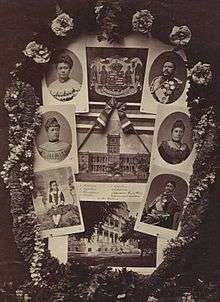House of Kalākaua
| House of Kalākaua | |
|---|---|
| Royal dynasty | |
|
Coat of arms of the Hawaii | |
| Country |
|
| Estates | ʻIolani Palace (seat) |
| Parent house | House of Keawe |
| Titles | King/Queen of Hawaii |
| Style(s) |
"Majesty" "Grace" |
| Founded | 1874 |
| Founder | Kalākaua |
| Final ruler | Liliuokalani |
| Dissolution | 1917 |
| Deposition | 1893 (deposed by a coup d'état) |
| Ethnicity | Hawaiian |
| Cadet branches | |

The House of Kalākaua, also known as the Keawe-a-Heulu line,[1] was the reigning family of the Kingdom of Hawaiʻi between the assumption of King David Kalākaua to the throne in 1874 and the overthrow of Queen Liliʻuokalani in 1893. Liliʻuokalani died in 1917, leaving only cousins as heirs. The House of Kalākaua was descended from chiefs on the island of Kauaʻi, and ascended to the royal throne by election when the males of the House of Kamehameha died out. The torch that burns at midday symbolizes the dynasty, based on the sacred kapu Kalākaua's ancestor High Chief Iwikauikaua.
Origin
The dynasty was founded by Kalākaua but included his brothers and sisters who were children of High Chiefess Analea Keohokālole and High Chief Caesar Kaluaiku Kapaʻakea. Through Kapaʻakea's paternal grandmother Alapa'iwahine he was great-great-grandson of Chief Keaweʻīkekahialiʻiokamoku the great-grandfather (through another son) of Kamehameha I. Through Kapaʻakea's paternal grandfather Kepoʻokalani (who was also Analea's grandfather) he was descended from one of the nīʻaupiʻo royal twins Kameʻeiamoku. Analea was great-great-granddaughter of Chief Keaweʻīkekahialiʻiokamoku on her mother Kamaʻeokalani's side and on her father ʻAikanaka's father and mother's side she was descended from High Chief Haʻae-a-Mahi, the father of Kekuʻiʻapowa (the mother of Kamehameha). Also on her father's side she was descended from Keawe-a-Heulu. Many of their ancestors were collateral cousins of King Kamehameha I.
Rise to power
At the time of Kamehameha V's death in 1872 the male line of Kamehameha had become extinct leaving Lunalilo and Kalākaua the only male relatives of the Kamehameha Dynasty. Lunalilo who had higher blood was victorious in the 1873 election. But by 1874 after Lunalilo's death Kalākaua was the closest male relative to Kamehameha, since the only remaining Kamehamehas were Ruth Keʻelikōlani and Bernice Pauahi Bishop and the only remaining descendants of Kamehameha's brothers Emma Rooke, Elizabeth Kekaʻaniau and Theresa Owana Laʻanui were all female.
Fall of the House of Kalākaua
With the deposition of queen Liliʻuokalani in 1893 the House of Kalākaua ceased to reign, and the death of the Princess Victoria Kaʻiulani in 1899 meant the loss of the last direct heir of the siblings of the reigning monarchs of House of Kalākaua. The main line of the dynasty thus ended when the deposed Queen Liliʻuokalani (who had abdicated and renounced) died in 1917. Their cousins came to be known as the House of Kawānanakoa, a branch of the House of Kalākaua, since they are relatives and appointed heirs of King Kalākaua, descended from the royal heir Prince David Kawānanakoa, eldest son of the princess Kūhiō Kinoike Kekaulike, who had died in 1908. The House of Kawānanakoa survives to modern times and at least two of its members have claims to the throne should the Hawaiian monarchy be revived.
Members
- King Kalākaua (1836–1891)
- Queen Liliʻuokalani (1839–1917)
- Crown Princess Victoria Kaʻiulani (1875–1899)
- Crown Prince William Pitt Leleiohoku (1854–1877)
- Princess Miriam Likelike (1851–1887)
- Princess Kaiminaʻauao (1844–1848)
- Prince James Kaliokalani (1835–1852)
- High Chief Caesar Kapaʻakea (1815–1866)
- High Chiefess Analea Keohokālole (1816–1869)
| Kalākaua family tree | ||||||||||||||||||||||||||||||||||||||||||||||||||||||||||||||||||||||||||||||||||||||||||||||||||||||||||||||||||||||||||||||||||||||||||||||||||||||||||||||||||||||||||||||||||||||||||||||||||||||||||||||||||||||||||||||||||||||||||||||||||||||||||||||||||||||||||||||||||||||||||||||||||||||||||||||||||||||||||||||||||||||||||||||||||||||||||||||||||||||||||||||||||||||||||||||||||||||||||||||||||||||||||||||||||||||||||||||||||||||||||||||||||||||||||||||||||||||||||||||||||||||||||||||||||||||||||||||||||||||||||||||||
|---|---|---|---|---|---|---|---|---|---|---|---|---|---|---|---|---|---|---|---|---|---|---|---|---|---|---|---|---|---|---|---|---|---|---|---|---|---|---|---|---|---|---|---|---|---|---|---|---|---|---|---|---|---|---|---|---|---|---|---|---|---|---|---|---|---|---|---|---|---|---|---|---|---|---|---|---|---|---|---|---|---|---|---|---|---|---|---|---|---|---|---|---|---|---|---|---|---|---|---|---|---|---|---|---|---|---|---|---|---|---|---|---|---|---|---|---|---|---|---|---|---|---|---|---|---|---|---|---|---|---|---|---|---|---|---|---|---|---|---|---|---|---|---|---|---|---|---|---|---|---|---|---|---|---|---|---|---|---|---|---|---|---|---|---|---|---|---|---|---|---|---|---|---|---|---|---|---|---|---|---|---|---|---|---|---|---|---|---|---|---|---|---|---|---|---|---|---|---|---|---|---|---|---|---|---|---|---|---|---|---|---|---|---|---|---|---|---|---|---|---|---|---|---|---|---|---|---|---|---|---|---|---|---|---|---|---|---|---|---|---|---|---|---|---|---|---|---|---|---|---|---|---|---|---|---|---|---|---|---|---|---|---|---|---|---|---|---|---|---|---|---|---|---|---|---|---|---|---|---|---|---|---|---|---|---|---|---|---|---|---|---|---|---|---|---|---|---|---|---|---|---|---|---|---|---|---|---|---|---|---|---|---|---|---|---|---|---|---|---|---|---|---|---|---|---|---|---|---|---|---|---|---|---|---|---|---|---|---|---|---|---|---|---|---|---|---|---|---|---|---|---|---|---|---|---|---|---|---|---|---|---|---|---|---|---|---|---|---|---|---|---|---|---|---|---|---|---|---|---|---|---|---|---|---|---|---|---|---|---|---|---|---|---|---|---|---|---|---|---|---|---|---|---|---|---|---|---|---|---|---|---|---|---|---|---|---|---|---|---|---|---|---|---|---|---|---|---|---|---|---|---|---|---|---|---|---|---|---|---|---|---|---|---|---|---|---|---|---|---|---|---|---|---|---|---|---|---|---|---|---|---|---|---|---|---|---|---|---|---|---|---|---|---|---|---|---|---|---|---|---|---|---|---|---|---|---|---|---|---|---|---|---|---|---|---|---|---|---|---|---|---|---|---|---|---|---|---|---|---|---|---|---|---|---|---|---|---|---|---|---|---|---|---|---|---|---|---|---|
| ||||||||||||||||||||||||||||||||||||||||||||||||||||||||||||||||||||||||||||||||||||||||||||||||||||||||||||||||||||||||||||||||||||||||||||||||||||||||||||||||||||||||||||||||||||||||||||||||||||||||||||||||||||||||||||||||||||||||||||||||||||||||||||||||||||||||||||||||||||||||||||||||||||||||||||||||||||||||||||||||||||||||||||||||||||||||||||||||||||||||||||||||||||||||||||||||||||||||||||||||||||||||||||||||||||||||||||||||||||||||||||||||||||||||||||||||||||||||||||||||||||||||||||||||||||||||||||||||||||||||||||||||
| Notes:
| ||||||||||||||||||||||||||||||||||||||||||||||||||||||||||||||||||||||||||||||||||||||||||||||||||||||||||||||||||||||||||||||||||||||||||||||||||||||||||||||||||||||||||||||||||||||||||||||||||||||||||||||||||||||||||||||||||||||||||||||||||||||||||||||||||||||||||||||||||||||||||||||||||||||||||||||||||||||||||||||||||||||||||||||||||||||||||||||||||||||||||||||||||||||||||||||||||||||||||||||||||||||||||||||||||||||||||||||||||||||||||||||||||||||||||||||||||||||||||||||||||||||||||||||||||||||||||||||||||||||||||||||||
References
- ↑ Van Dyke, Jon M. (2008). Who Owns the Crown Lands of Hawaiʻi?. Honolulu: University of Hawaii Press. p. 96. ISBN 978-0-8248-3211-7. OCLC 163812857.
